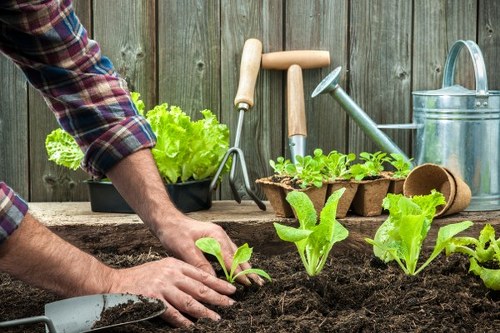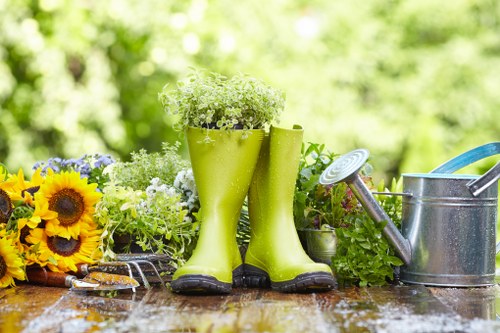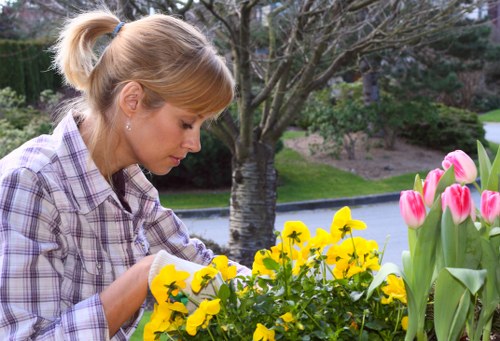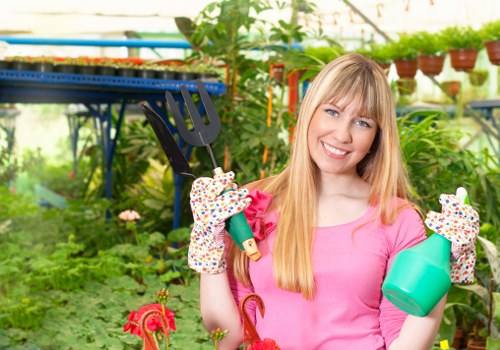Comprehensive Guide to Garden Maintenance in Downham

Introduction to Garden Maintenance
Maintaining a beautiful garden in Downham requires a combination of knowledge, dedication, and the right tools. Whether you're a seasoned gardener or a novice, understanding the essentials of garden upkeep can transform your outdoor space into a lush, vibrant haven.
Downham's unique climate and soil conditions mean that specific strategies are necessary to ensure your garden thrives. From selecting the right plants to implementing effective maintenance routines, this guide will provide you with all the information you need to keep your garden in top shape.
In the following sections, we'll explore various aspects of garden maintenance, including seasonal tasks, pest control, soil health, and more. By the end of this article, you'll have a comprehensive understanding of how to maintain a healthy and beautiful garden in Downham.

Seasonal Garden Maintenance
Spring Maintenance
Spring is a critical time for garden maintenance in Downham. As the weather begins to warm, it's essential to prepare your garden for the growing season.
Key Spring Tasks:
- Pruning dead or damaged branches
- Planting new flowers and shrubs
- Fertilizing soil to replenish nutrients
Starting early in the season ensures that your garden gets a healthy start, promoting robust growth throughout the spring and summer months.
Summer Maintenance
Summer in Downham can be warm and dry, making regular maintenance crucial to keep your garden thriving.
Essential Summer Tasks:
- Consistent watering schedules
- Weeding to prevent competition for resources
- Monitoring for pests and diseases
Implementing these tasks will help your plants withstand the heat and continue to grow strong.

Soil Health and Preparation
The foundation of any healthy garden is its soil. In Downham, the soil can vary, so it's essential to test and amend it as needed.
Soil Testing
Conducting a soil test helps determine its pH and nutrient levels. This information is vital for selecting the right plants and fertilizers.
Benefits of Soil Testing:
- Identifies nutrient deficiencies
- Helps in selecting appropriate plant species
- Improves overall plant health
Regular soil testing ensures that your garden remains fertile and capable of supporting diverse plant life.
Amending the Soil
Based on your soil test results, you may need to adjust the soil composition. Adding organic matter, such as compost, can enhance soil structure and fertility.
Common Soil Amendments:
- Compost
- Peat moss
- Perlite or vermiculite
Proper soil amendment fosters a conducive environment for plant roots, promoting healthy growth and increased resistance to pests.

Pest and Disease Management
Protecting your garden from pests and diseases is crucial for maintaining plant health in Downham.
Integrated Pest Management (IPM)
IPM is a sustainable approach to pest control that minimizes the use of chemicals while managing pest populations effectively.
IPM Strategies:
- Regular monitoring of plant health
- Encouraging beneficial insects
- Using physical barriers like nets and row covers
Implementing IPM practices helps maintain a balanced ecosystem in your garden, reducing the likelihood of severe pest infestations.
Common Garden Pests in Downham
Being aware of common pests can help you take proactive measures to protect your garden.
Frequent Pests:
- Aphids
- Slugs and snails
- Japanese beetles
Each pest requires specific control methods, so understanding their behavior and life cycles is essential for effective management.

Plant Selection and Care
Choosing the right plants is vital for a successful garden in Downham. Opt for species that are well-suited to the local climate and soil conditions.
Native Plants
Native plants are adapted to Downham's environment, making them more resilient and easier to maintain.
Advantages of Native Plants:
- Require less water and fertilizer
- Resistant to local pests and diseases
- Support local wildlife and biodiversity
Incorporating native plants into your garden creates a sustainable and thriving ecosystem.
Annuals vs. Perennials
Understanding the difference between annuals and perennials can help you plan your garden effectively.
Annuals: Complete their life cycle in one growing season and need to be replanted each year.
Perennials: Live for multiple years, providing long-term structure and stability to your garden.
Balancing annuals and perennials allows for continuous bloom and a well-organized garden structure year after year.

Irrigation and Water Management
Efficient water usage is essential for maintaining a healthy garden, especially during the warmer months in Downham.
Watering Techniques
Proper watering techniques ensure that your plants receive the right amount of moisture without over- or under-watering.
Effective Techniques:
- Drip irrigation systems
- Soaker hoses
- Mulching to retain soil moisture
Implementing these techniques can enhance water efficiency and promote deeper root growth.
Rainwater Harvesting
Collecting rainwater is an environmentally friendly way to supply your garden with necessary hydration.
Benefits of Rainwater Harvesting:
- Reduces dependency on municipal water
- Minimizes water bills
- Provides soft water free of chlorine and other chemicals
Setting up a rainwater harvesting system can contribute to a more sustainable and cost-effective garden maintenance routine.

Pruning and Trimming
Regular pruning and trimming are essential practices for maintaining plant health and garden aesthetics.
Pruning Techniques
Proper pruning techniques encourage healthy growth and prevent disease in your plants.
Essential Pruning Tips:
- Use sharp, clean tools to make precise cuts
- Remove dead or diseased branches promptly
- Prune at the right time of year for each plant species
Consistent pruning helps shape plants, promotes airflow, and enhances the overall appearance of your garden.
Trimming Hedges and Shrubs
Maintaining well-trimmed hedges and shrubs adds structure and definition to your garden layout.
Trimming Best Practices:
- Trim during the dormant season to minimize stress on plants
- Shape shrubs uniformly for a tidy appearance
- Avoid cutting too much at once to prevent shock
Regular trimming ensures that your hedges and shrubs remain healthy and visually appealing.

Lawn Care and Maintenance
A well-maintained lawn serves as the foundation of your garden, enhancing its overall beauty and functionality.
Mowing Practices
Proper mowing techniques contribute to a lush and healthy lawn in Downham.
Key Mowing Tips:
- Mow at the correct height for your grass type
- Keep mower blades sharp for clean cuts
- Vary mowing patterns to prevent soil compaction
Adhering to these practices ensures your lawn remains dense and resilient.
Fertilization and Aeration
Regular fertilization and aeration are crucial for maintaining a vibrant and healthy lawn.
Lawn Care Steps:
- Apply appropriate fertilizers based on soil test results
- Aerate the lawn to improve soil structure and nutrient uptake
- Overseed bare or thin areas to promote uniform growth
These maintenance steps help your lawn recover from seasonal stresses and maintain its lush appearance.

Mulching and Weed Control
Mulching and effective weed control are essential for conserving soil moisture and preventing unwanted plant growth.
Benefits of Mulching
Applying mulch to your garden beds offers numerous advantages for plant health and garden aesthetics.
Advantages of Mulching:
- Retains soil moisture
- Suppresses weed growth
- Regulates soil temperature
Choosing the right type of mulch, such as organic options like bark or compost, can enhance these benefits.
Weed Control Strategies
Effective weed management keeps your garden beds clean and plants healthy.
Common Weed Control Methods:
- Hand weeding to remove unwanted plants directly
- Using landscape fabric to block weed growth
- Applying eco-friendly herbicides when necessary
Consistent weed control efforts prevent competition for nutrients and space, ensuring your plants thrive.

Garden Tools and Equipment
Having the right tools is essential for efficient and effective garden maintenance in Downham.
Essential Garden Tools
Investing in quality garden tools can make maintenance tasks easier and more enjoyable.
Must-Have Tools:
- Pruning shears and loppers
- Garden gloves for protection
- Spade and hoe for soil preparation
Keeping your tools in good condition extends their lifespan and ensures optimal performance.
Power Tools for Advanced Maintenance
For larger gardens or more intensive tasks, power tools can significantly enhance your maintenance routine.
Recommended Power Tools:
- Lawnmower for efficient grass cutting
- Leaf blower to quickly clear debris
- Hedge trimmer for precise shrub maintenance
Using power tools appropriately can save time and effort, allowing for more thorough garden care.

Professional Garden Maintenance Services in Downham
While DIY garden maintenance is rewarding, sometimes professional assistance can ensure optimal results.
Benefits of Hiring Professionals
Professional garden maintenance services offer expertise and efficiency, handling tasks that might be challenging for amateur gardeners.
Advantages of Professional Services:
- Expert knowledge of local plant species and soil conditions
- Access to specialized tools and equipment
- Time-saving, allowing you to enjoy your garden without the hassle
Hiring professionals can elevate the appearance and health of your garden, making it a beautiful and relaxing space.
Choosing the Right Service Provider
Selecting a reputable garden maintenance service ensures that your garden receives the best care possible.
Factors to Consider:
- Experience and expertise in local gardening conditions
- Range of services offered
- Customer reviews and references
Taking the time to choose the right provider will result in a well-maintained and thriving garden.

Eco-Friendly Garden Practices
Adopting eco-friendly practices in garden maintenance benefits both your garden and the environment.
Sustainable Gardening Techniques
Implementing sustainable techniques ensures that your garden remains healthy without depleting natural resources.
Key Sustainable Practices:
- Composting organic waste to create natural fertilizer
- Using native and drought-resistant plants
- Minimizing chemical pesticide and fertilizer use
These practices promote a balanced ecosystem and reduce your garden's environmental footprint.
Natural Pest Control
Utilizing natural methods to manage pests supports a healthy and chemical-free garden.
Effective Natural Pest Controls:
- Introducing beneficial insects like ladybugs and predatory beetles
- Using neem oil or insecticidal soap
- Planting pest-resistant varieties
Natural pest control methods maintain plant health while preserving the ecological balance.

Winter Garden Preparation
Preparing your garden for winter in Downham ensures that your plants survive the colder months and thrive in the spring.
Protecting Plants from Frost
Frost can be damaging to many garden plants, making protective measures essential.
Protection Tips:
- Cover sensitive plants with frost cloths or blankets
- Mulch around plant bases to insulate roots
- Bring potted plants indoors or into sheltered areas
These steps help prevent frost damage, ensuring your plants remain healthy through the winter.
Cleaning and Storing Tools
Proper maintenance of your garden tools during winter extends their lifespan and ensures they are ready for use in the spring.
Winter Tool Care:
- Clean tools thoroughly to remove soil and debris
- Sharpen blades and apply protective oil
- Store tools in a dry, sheltered location
Taking care of your tools during the off-season prevents rust and damage, keeping them in top condition for future use.

Creating a Garden Maintenance Schedule
A structured maintenance schedule helps you stay organized and ensures that all essential tasks are completed on time.
Monthly Checklist
Having a monthly checklist keeps your garden tasks manageable and prevents oversight.
Sample Monthly Tasks:
- January: Plan garden layout and order seeds
- February: Start seed indoors and prune dormant plants
- March: Begin soil preparation and plant early spring flowers
- April: Continue planting and start fertilizing
- May: Implement pest control measures and maintain irrigation systems
- June: Regular mowing and weeding
- July: Monitor for pests and diseases and adjust watering as needed
- August: Harvest vegetables and prepare for fall planting
- September: Begin fall cleanup and plant perennials
- October: Mulch beds and protect plants from frost
- November: Clean and store tools, continue mulching
- December: Review garden progress and plan for next year
Adapting to Seasonal Changes
Being flexible and adapting your maintenance schedule to seasonal variations ensures that your garden remains healthy year-round.
Adaptation Strategies:
- Adjust watering based on rainfall and temperature
- Modify pruning techniques according to plant growth cycles
- Plan for unexpected weather events, such as late frosts or heavy rains
A dynamic schedule allows you to respond effectively to changing conditions, maintaining garden health and beauty.

Conclusion: Enjoying a Beautiful Garden in Downham
Effective garden maintenance in Downham combines knowledge, planning, and consistent effort. By following the practices outlined in this guide, you can create and maintain a garden that not only looks stunning but also supports a healthy ecosystem.
Whether you choose to undertake maintenance tasks yourself or hire professional services, the key is to stay informed and proactive. Regular care ensures that your garden remains a source of pride and enjoyment for years to come.
Contact us today to learn more about our garden maintenance services and how we can help you achieve the garden of your dreams. Book your service now and take the first step towards a thriving, beautiful garden in Downham.

